Reflective Writing: Analyzing Strengths, Weaknesses, and Stressors
VerifiedAdded on 2022/09/11
|11
|2681
|25
Journal and Reflective Writing
AI Summary
This reflective writing assignment explores personal development and stress management within the context of healthcare. The author utilizes Kolb's Reflective Cycle to analyze their learning process, identifying strengths like practice-based learning and communication skills, while also acknowledging weaknesses. The assignment then delves into stressors common to healthcare professionals, such as long working hours and tight deadlines, and suggests strategies for managing these stressors, including emotional intelligence training and cognitive-behavioral methods. The author emphasizes the importance of reflective writing for self-awareness and continuous improvement, advocating for organized learning, learning from mistakes, and implementing stress management techniques to enhance professional effectiveness. The assignment concludes by highlighting the value of reflective writing in improving professional skills and overall well-being.
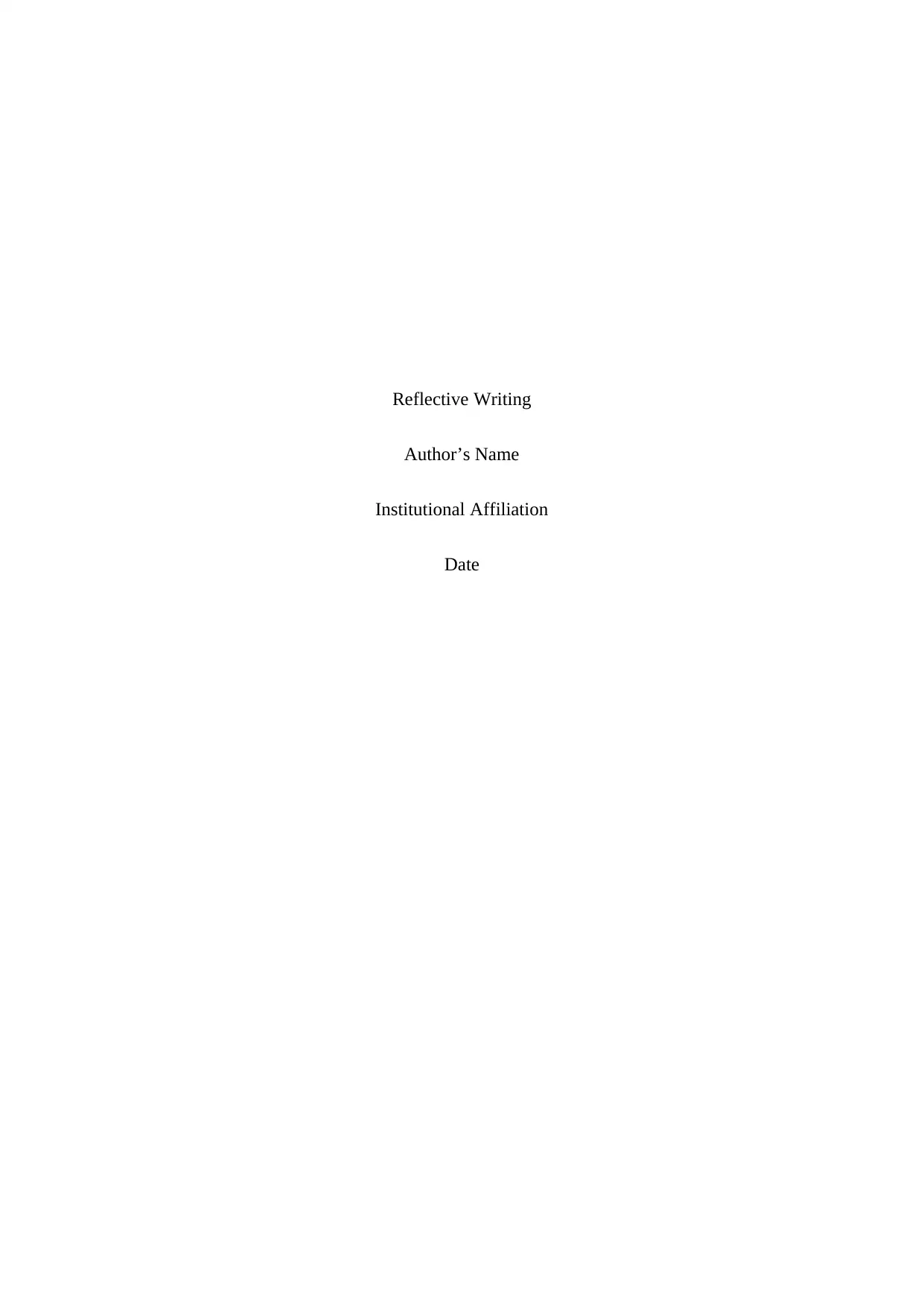
Reflective Writing
Author’s Name
Institutional Affiliation
Date
Author’s Name
Institutional Affiliation
Date
Paraphrase This Document
Need a fresh take? Get an instant paraphrase of this document with our AI Paraphraser
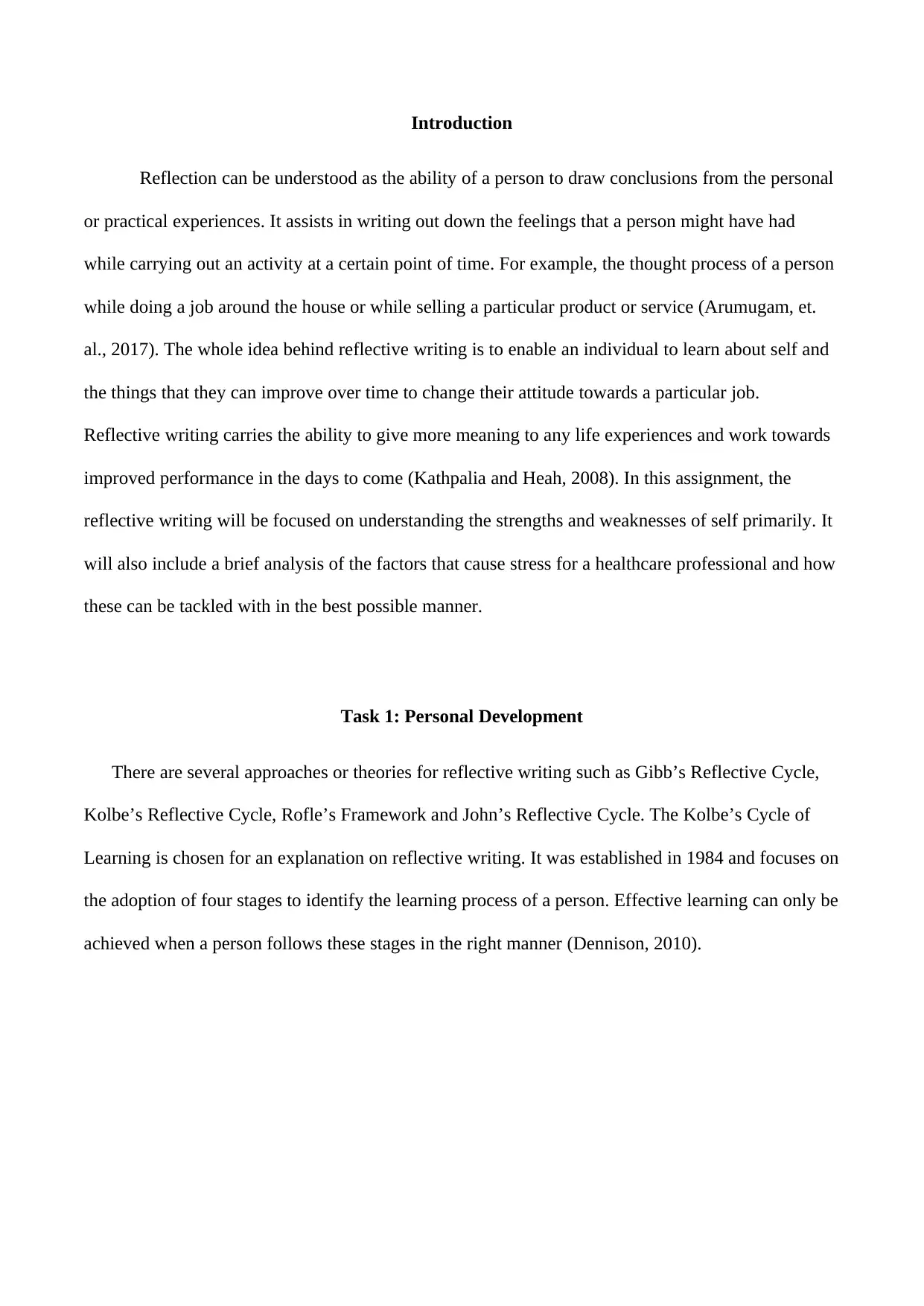
Introduction
Reflection can be understood as the ability of a person to draw conclusions from the personal
or practical experiences. It assists in writing out down the feelings that a person might have had
while carrying out an activity at a certain point of time. For example, the thought process of a person
while doing a job around the house or while selling a particular product or service (Arumugam, et.
al., 2017). The whole idea behind reflective writing is to enable an individual to learn about self and
the things that they can improve over time to change their attitude towards a particular job.
Reflective writing carries the ability to give more meaning to any life experiences and work towards
improved performance in the days to come (Kathpalia and Heah, 2008). In this assignment, the
reflective writing will be focused on understanding the strengths and weaknesses of self primarily. It
will also include a brief analysis of the factors that cause stress for a healthcare professional and how
these can be tackled with in the best possible manner.
Task 1: Personal Development
There are several approaches or theories for reflective writing such as Gibb’s Reflective Cycle,
Kolbe’s Reflective Cycle, Rofle’s Framework and John’s Reflective Cycle. The Kolbe’s Cycle of
Learning is chosen for an explanation on reflective writing. It was established in 1984 and focuses on
the adoption of four stages to identify the learning process of a person. Effective learning can only be
achieved when a person follows these stages in the right manner (Dennison, 2010).
Reflection can be understood as the ability of a person to draw conclusions from the personal
or practical experiences. It assists in writing out down the feelings that a person might have had
while carrying out an activity at a certain point of time. For example, the thought process of a person
while doing a job around the house or while selling a particular product or service (Arumugam, et.
al., 2017). The whole idea behind reflective writing is to enable an individual to learn about self and
the things that they can improve over time to change their attitude towards a particular job.
Reflective writing carries the ability to give more meaning to any life experiences and work towards
improved performance in the days to come (Kathpalia and Heah, 2008). In this assignment, the
reflective writing will be focused on understanding the strengths and weaknesses of self primarily. It
will also include a brief analysis of the factors that cause stress for a healthcare professional and how
these can be tackled with in the best possible manner.
Task 1: Personal Development
There are several approaches or theories for reflective writing such as Gibb’s Reflective Cycle,
Kolbe’s Reflective Cycle, Rofle’s Framework and John’s Reflective Cycle. The Kolbe’s Cycle of
Learning is chosen for an explanation on reflective writing. It was established in 1984 and focuses on
the adoption of four stages to identify the learning process of a person. Effective learning can only be
achieved when a person follows these stages in the right manner (Dennison, 2010).
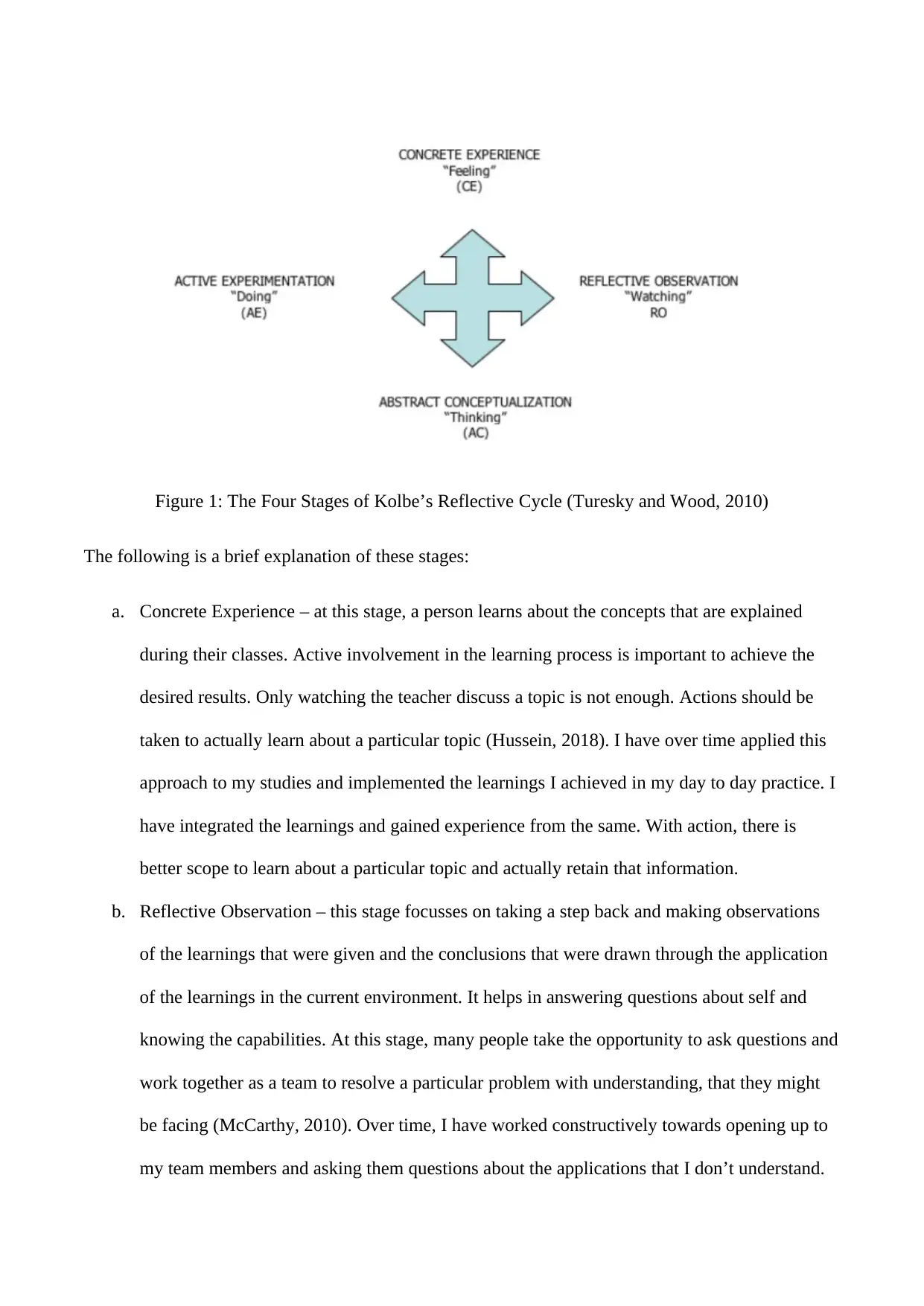
Figure 1: The Four Stages of Kolbe’s Reflective Cycle (Turesky and Wood, 2010)
The following is a brief explanation of these stages:
a. Concrete Experience – at this stage, a person learns about the concepts that are explained
during their classes. Active involvement in the learning process is important to achieve the
desired results. Only watching the teacher discuss a topic is not enough. Actions should be
taken to actually learn about a particular topic (Hussein, 2018). I have over time applied this
approach to my studies and implemented the learnings I achieved in my day to day practice. I
have integrated the learnings and gained experience from the same. With action, there is
better scope to learn about a particular topic and actually retain that information.
b. Reflective Observation – this stage focusses on taking a step back and making observations
of the learnings that were given and the conclusions that were drawn through the application
of the learnings in the current environment. It helps in answering questions about self and
knowing the capabilities. At this stage, many people take the opportunity to ask questions and
work together as a team to resolve a particular problem with understanding, that they might
be facing (McCarthy, 2010). Over time, I have worked constructively towards opening up to
my team members and asking them questions about the applications that I don’t understand.
The following is a brief explanation of these stages:
a. Concrete Experience – at this stage, a person learns about the concepts that are explained
during their classes. Active involvement in the learning process is important to achieve the
desired results. Only watching the teacher discuss a topic is not enough. Actions should be
taken to actually learn about a particular topic (Hussein, 2018). I have over time applied this
approach to my studies and implemented the learnings I achieved in my day to day practice. I
have integrated the learnings and gained experience from the same. With action, there is
better scope to learn about a particular topic and actually retain that information.
b. Reflective Observation – this stage focusses on taking a step back and making observations
of the learnings that were given and the conclusions that were drawn through the application
of the learnings in the current environment. It helps in answering questions about self and
knowing the capabilities. At this stage, many people take the opportunity to ask questions and
work together as a team to resolve a particular problem with understanding, that they might
be facing (McCarthy, 2010). Over time, I have worked constructively towards opening up to
my team members and asking them questions about the applications that I don’t understand.
⊘ This is a preview!⊘
Do you want full access?
Subscribe today to unlock all pages.

Trusted by 1+ million students worldwide
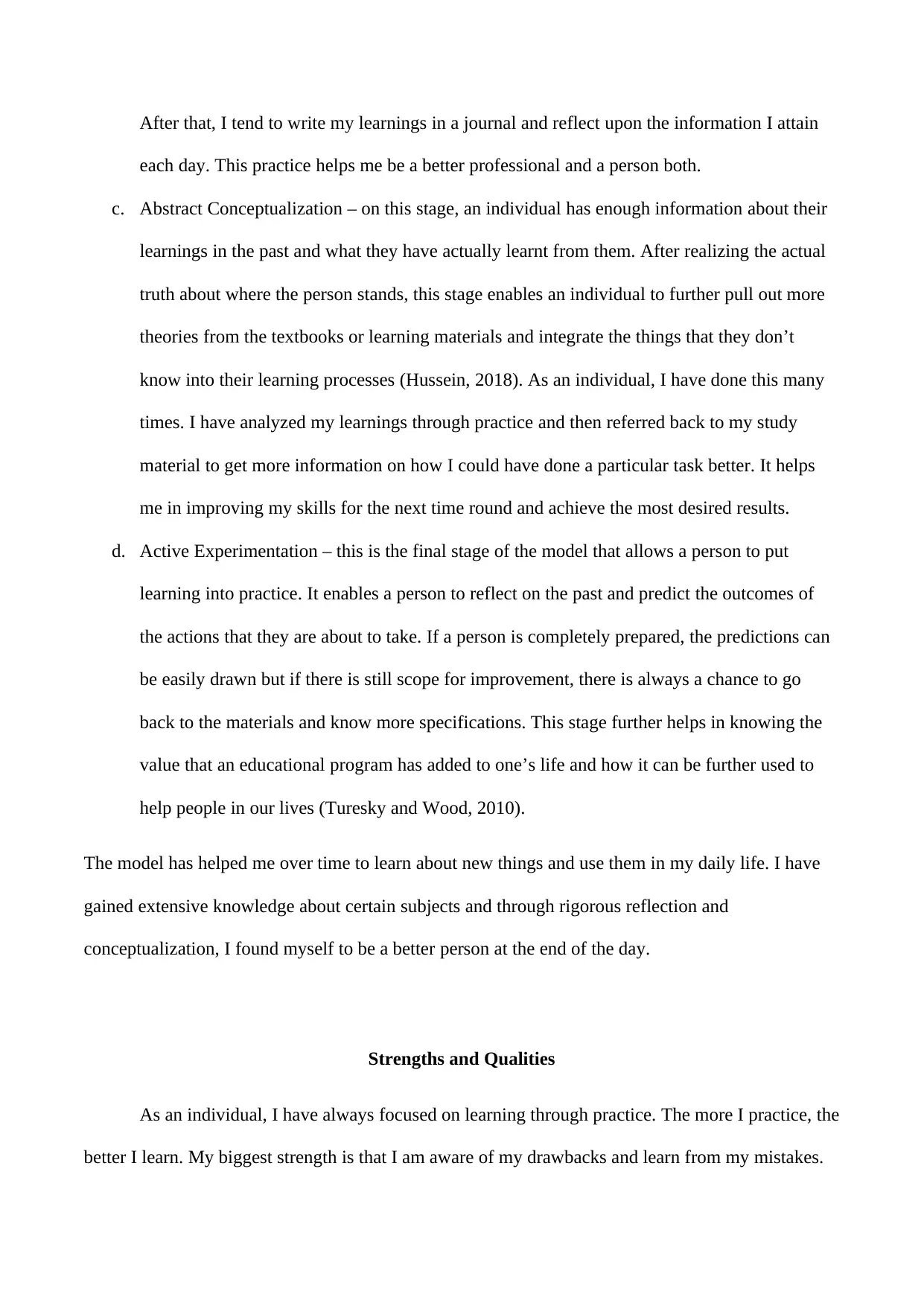
After that, I tend to write my learnings in a journal and reflect upon the information I attain
each day. This practice helps me be a better professional and a person both.
c. Abstract Conceptualization – on this stage, an individual has enough information about their
learnings in the past and what they have actually learnt from them. After realizing the actual
truth about where the person stands, this stage enables an individual to further pull out more
theories from the textbooks or learning materials and integrate the things that they don’t
know into their learning processes (Hussein, 2018). As an individual, I have done this many
times. I have analyzed my learnings through practice and then referred back to my study
material to get more information on how I could have done a particular task better. It helps
me in improving my skills for the next time round and achieve the most desired results.
d. Active Experimentation – this is the final stage of the model that allows a person to put
learning into practice. It enables a person to reflect on the past and predict the outcomes of
the actions that they are about to take. If a person is completely prepared, the predictions can
be easily drawn but if there is still scope for improvement, there is always a chance to go
back to the materials and know more specifications. This stage further helps in knowing the
value that an educational program has added to one’s life and how it can be further used to
help people in our lives (Turesky and Wood, 2010).
The model has helped me over time to learn about new things and use them in my daily life. I have
gained extensive knowledge about certain subjects and through rigorous reflection and
conceptualization, I found myself to be a better person at the end of the day.
Strengths and Qualities
As an individual, I have always focused on learning through practice. The more I practice, the
better I learn. My biggest strength is that I am aware of my drawbacks and learn from my mistakes.
each day. This practice helps me be a better professional and a person both.
c. Abstract Conceptualization – on this stage, an individual has enough information about their
learnings in the past and what they have actually learnt from them. After realizing the actual
truth about where the person stands, this stage enables an individual to further pull out more
theories from the textbooks or learning materials and integrate the things that they don’t
know into their learning processes (Hussein, 2018). As an individual, I have done this many
times. I have analyzed my learnings through practice and then referred back to my study
material to get more information on how I could have done a particular task better. It helps
me in improving my skills for the next time round and achieve the most desired results.
d. Active Experimentation – this is the final stage of the model that allows a person to put
learning into practice. It enables a person to reflect on the past and predict the outcomes of
the actions that they are about to take. If a person is completely prepared, the predictions can
be easily drawn but if there is still scope for improvement, there is always a chance to go
back to the materials and know more specifications. This stage further helps in knowing the
value that an educational program has added to one’s life and how it can be further used to
help people in our lives (Turesky and Wood, 2010).
The model has helped me over time to learn about new things and use them in my daily life. I have
gained extensive knowledge about certain subjects and through rigorous reflection and
conceptualization, I found myself to be a better person at the end of the day.
Strengths and Qualities
As an individual, I have always focused on learning through practice. The more I practice, the
better I learn. My biggest strength is that I am aware of my drawbacks and learn from my mistakes.
Paraphrase This Document
Need a fresh take? Get an instant paraphrase of this document with our AI Paraphraser
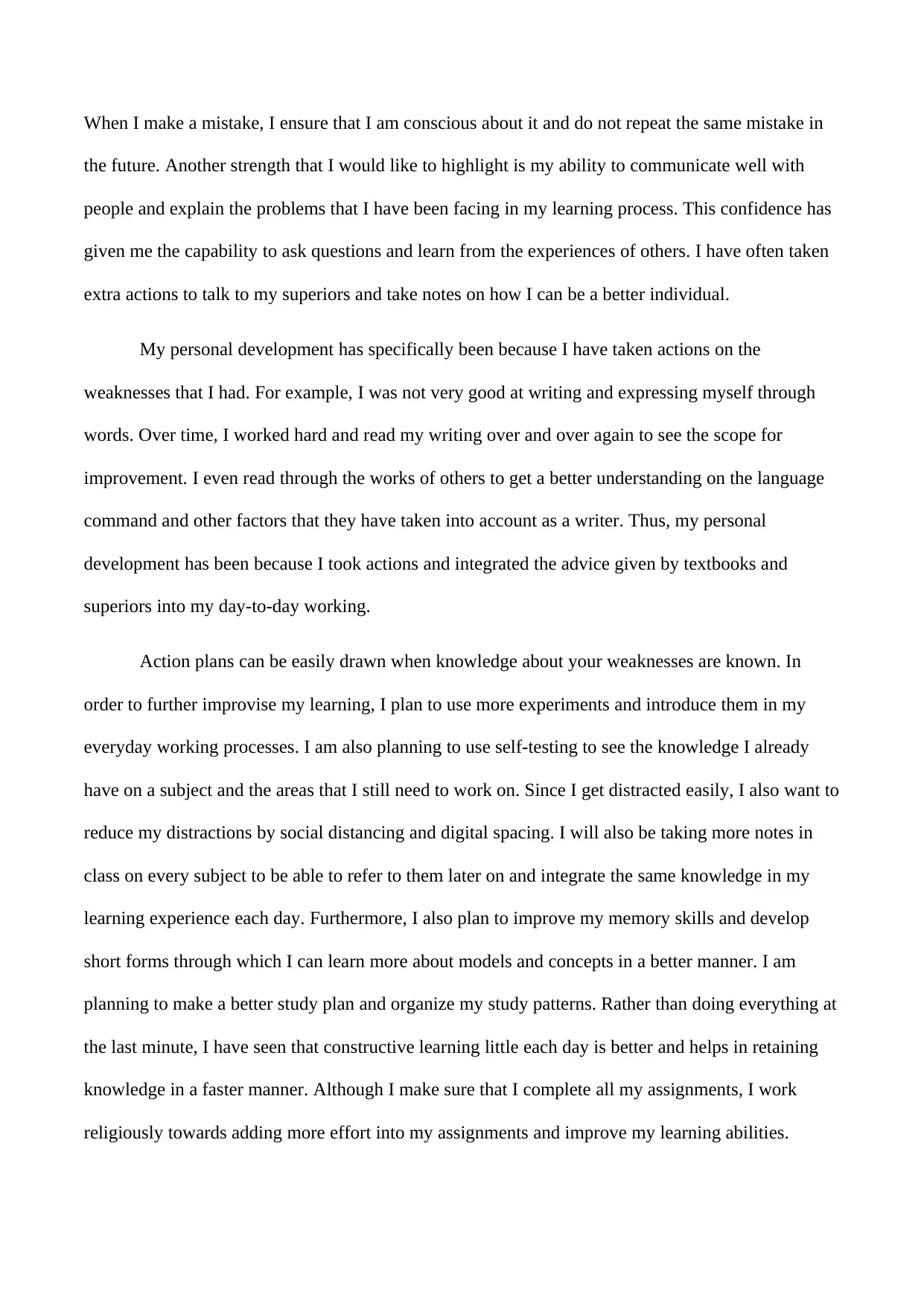
When I make a mistake, I ensure that I am conscious about it and do not repeat the same mistake in
the future. Another strength that I would like to highlight is my ability to communicate well with
people and explain the problems that I have been facing in my learning process. This confidence has
given me the capability to ask questions and learn from the experiences of others. I have often taken
extra actions to talk to my superiors and take notes on how I can be a better individual.
My personal development has specifically been because I have taken actions on the
weaknesses that I had. For example, I was not very good at writing and expressing myself through
words. Over time, I worked hard and read my writing over and over again to see the scope for
improvement. I even read through the works of others to get a better understanding on the language
command and other factors that they have taken into account as a writer. Thus, my personal
development has been because I took actions and integrated the advice given by textbooks and
superiors into my day-to-day working.
Action plans can be easily drawn when knowledge about your weaknesses are known. In
order to further improvise my learning, I plan to use more experiments and introduce them in my
everyday working processes. I am also planning to use self-testing to see the knowledge I already
have on a subject and the areas that I still need to work on. Since I get distracted easily, I also want to
reduce my distractions by social distancing and digital spacing. I will also be taking more notes in
class on every subject to be able to refer to them later on and integrate the same knowledge in my
learning experience each day. Furthermore, I also plan to improve my memory skills and develop
short forms through which I can learn more about models and concepts in a better manner. I am
planning to make a better study plan and organize my study patterns. Rather than doing everything at
the last minute, I have seen that constructive learning little each day is better and helps in retaining
knowledge in a faster manner. Although I make sure that I complete all my assignments, I work
religiously towards adding more effort into my assignments and improve my learning abilities.
the future. Another strength that I would like to highlight is my ability to communicate well with
people and explain the problems that I have been facing in my learning process. This confidence has
given me the capability to ask questions and learn from the experiences of others. I have often taken
extra actions to talk to my superiors and take notes on how I can be a better individual.
My personal development has specifically been because I have taken actions on the
weaknesses that I had. For example, I was not very good at writing and expressing myself through
words. Over time, I worked hard and read my writing over and over again to see the scope for
improvement. I even read through the works of others to get a better understanding on the language
command and other factors that they have taken into account as a writer. Thus, my personal
development has been because I took actions and integrated the advice given by textbooks and
superiors into my day-to-day working.
Action plans can be easily drawn when knowledge about your weaknesses are known. In
order to further improvise my learning, I plan to use more experiments and introduce them in my
everyday working processes. I am also planning to use self-testing to see the knowledge I already
have on a subject and the areas that I still need to work on. Since I get distracted easily, I also want to
reduce my distractions by social distancing and digital spacing. I will also be taking more notes in
class on every subject to be able to refer to them later on and integrate the same knowledge in my
learning experience each day. Furthermore, I also plan to improve my memory skills and develop
short forms through which I can learn more about models and concepts in a better manner. I am
planning to make a better study plan and organize my study patterns. Rather than doing everything at
the last minute, I have seen that constructive learning little each day is better and helps in retaining
knowledge in a faster manner. Although I make sure that I complete all my assignments, I work
religiously towards adding more effort into my assignments and improve my learning abilities.
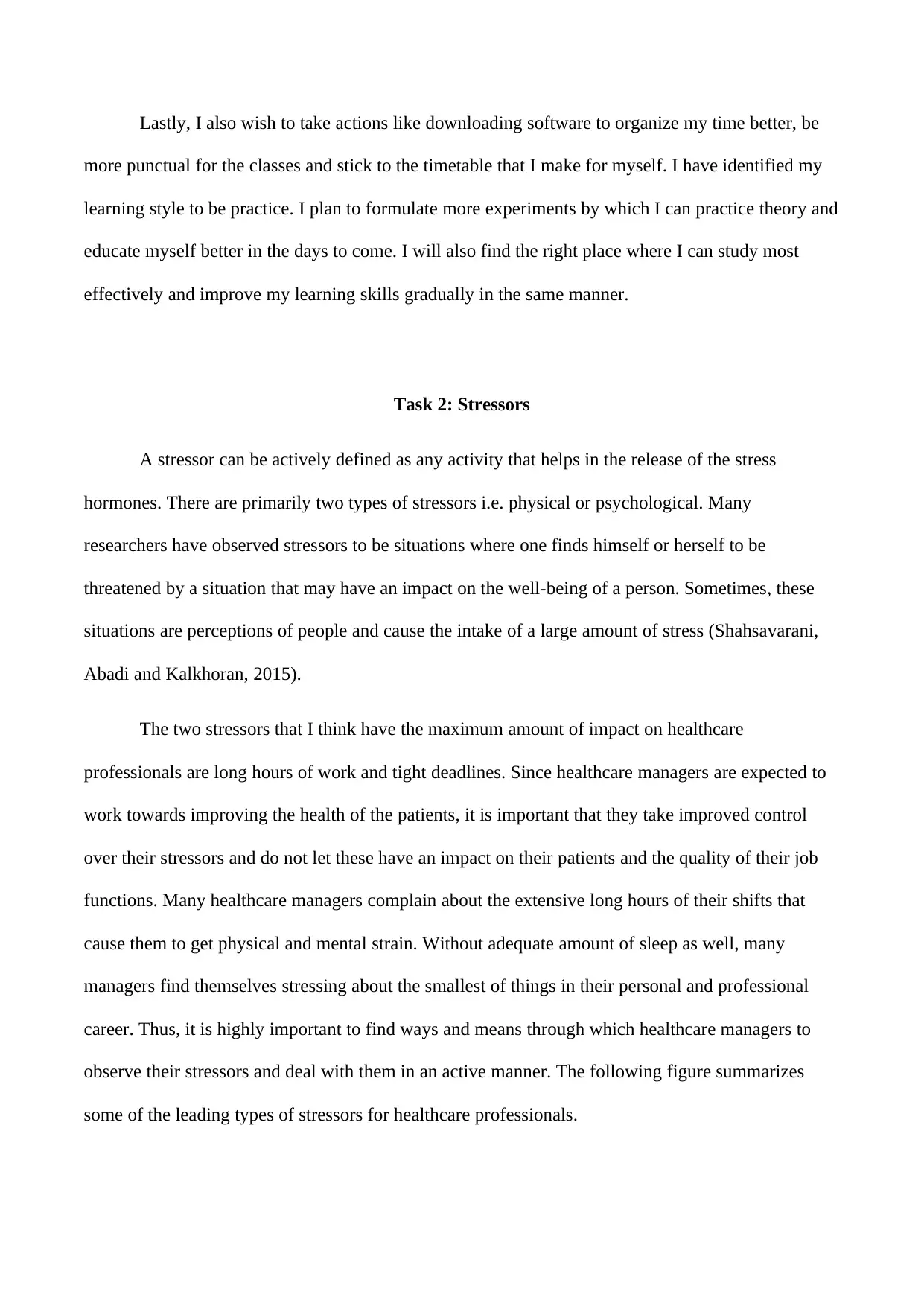
Lastly, I also wish to take actions like downloading software to organize my time better, be
more punctual for the classes and stick to the timetable that I make for myself. I have identified my
learning style to be practice. I plan to formulate more experiments by which I can practice theory and
educate myself better in the days to come. I will also find the right place where I can study most
effectively and improve my learning skills gradually in the same manner.
Task 2: Stressors
A stressor can be actively defined as any activity that helps in the release of the stress
hormones. There are primarily two types of stressors i.e. physical or psychological. Many
researchers have observed stressors to be situations where one finds himself or herself to be
threatened by a situation that may have an impact on the well-being of a person. Sometimes, these
situations are perceptions of people and cause the intake of a large amount of stress (Shahsavarani,
Abadi and Kalkhoran, 2015).
The two stressors that I think have the maximum amount of impact on healthcare
professionals are long hours of work and tight deadlines. Since healthcare managers are expected to
work towards improving the health of the patients, it is important that they take improved control
over their stressors and do not let these have an impact on their patients and the quality of their job
functions. Many healthcare managers complain about the extensive long hours of their shifts that
cause them to get physical and mental strain. Without adequate amount of sleep as well, many
managers find themselves stressing about the smallest of things in their personal and professional
career. Thus, it is highly important to find ways and means through which healthcare managers to
observe their stressors and deal with them in an active manner. The following figure summarizes
some of the leading types of stressors for healthcare professionals.
more punctual for the classes and stick to the timetable that I make for myself. I have identified my
learning style to be practice. I plan to formulate more experiments by which I can practice theory and
educate myself better in the days to come. I will also find the right place where I can study most
effectively and improve my learning skills gradually in the same manner.
Task 2: Stressors
A stressor can be actively defined as any activity that helps in the release of the stress
hormones. There are primarily two types of stressors i.e. physical or psychological. Many
researchers have observed stressors to be situations where one finds himself or herself to be
threatened by a situation that may have an impact on the well-being of a person. Sometimes, these
situations are perceptions of people and cause the intake of a large amount of stress (Shahsavarani,
Abadi and Kalkhoran, 2015).
The two stressors that I think have the maximum amount of impact on healthcare
professionals are long hours of work and tight deadlines. Since healthcare managers are expected to
work towards improving the health of the patients, it is important that they take improved control
over their stressors and do not let these have an impact on their patients and the quality of their job
functions. Many healthcare managers complain about the extensive long hours of their shifts that
cause them to get physical and mental strain. Without adequate amount of sleep as well, many
managers find themselves stressing about the smallest of things in their personal and professional
career. Thus, it is highly important to find ways and means through which healthcare managers to
observe their stressors and deal with them in an active manner. The following figure summarizes
some of the leading types of stressors for healthcare professionals.
⊘ This is a preview!⊘
Do you want full access?
Subscribe today to unlock all pages.

Trusted by 1+ million students worldwide
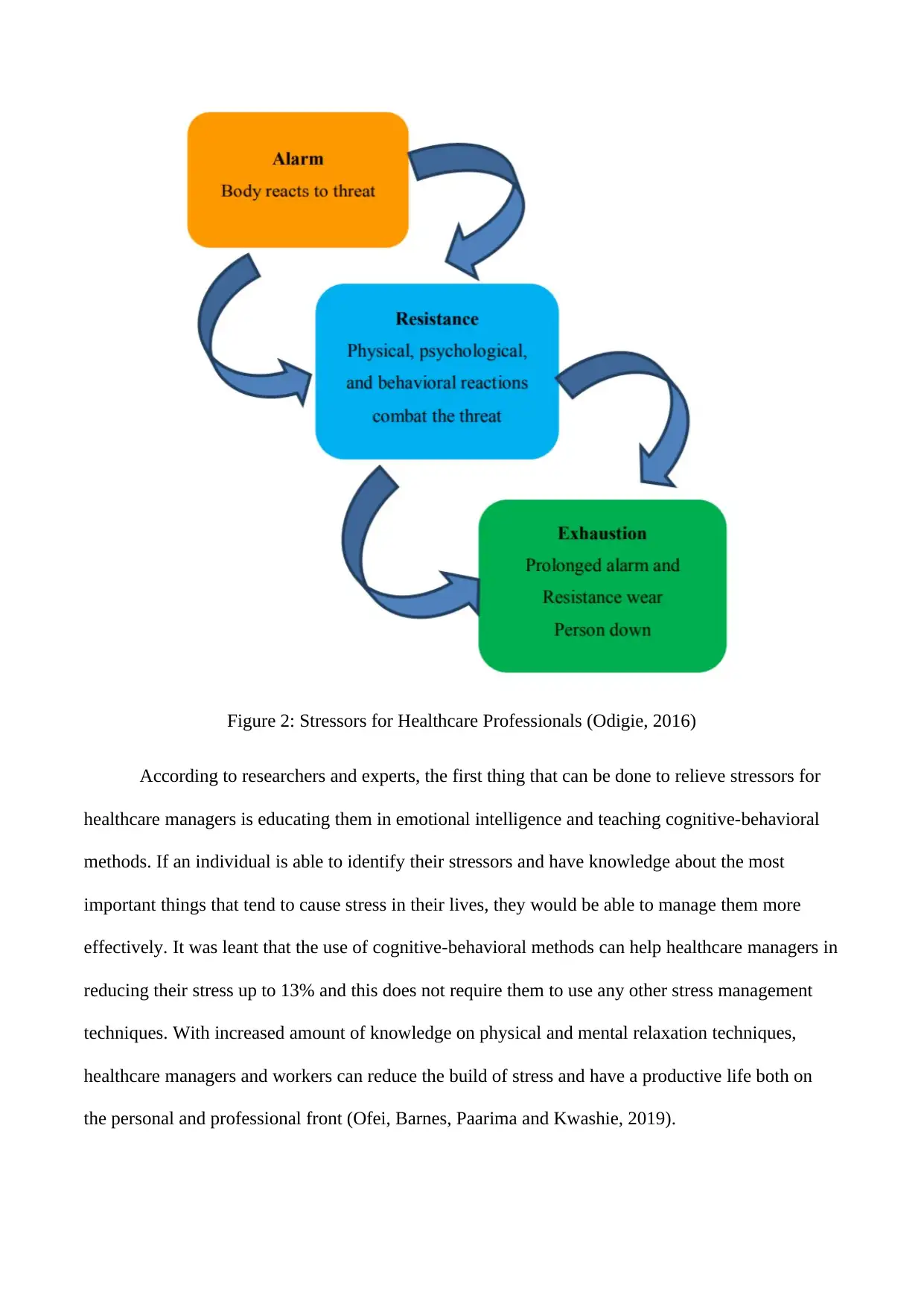
Figure 2: Stressors for Healthcare Professionals (Odigie, 2016)
According to researchers and experts, the first thing that can be done to relieve stressors for
healthcare managers is educating them in emotional intelligence and teaching cognitive-behavioral
methods. If an individual is able to identify their stressors and have knowledge about the most
important things that tend to cause stress in their lives, they would be able to manage them more
effectively. It was leant that the use of cognitive-behavioral methods can help healthcare managers in
reducing their stress up to 13% and this does not require them to use any other stress management
techniques. With increased amount of knowledge on physical and mental relaxation techniques,
healthcare managers and workers can reduce the build of stress and have a productive life both on
the personal and professional front (Ofei, Barnes, Paarima and Kwashie, 2019).
According to researchers and experts, the first thing that can be done to relieve stressors for
healthcare managers is educating them in emotional intelligence and teaching cognitive-behavioral
methods. If an individual is able to identify their stressors and have knowledge about the most
important things that tend to cause stress in their lives, they would be able to manage them more
effectively. It was leant that the use of cognitive-behavioral methods can help healthcare managers in
reducing their stress up to 13% and this does not require them to use any other stress management
techniques. With increased amount of knowledge on physical and mental relaxation techniques,
healthcare managers and workers can reduce the build of stress and have a productive life both on
the personal and professional front (Ofei, Barnes, Paarima and Kwashie, 2019).
Paraphrase This Document
Need a fresh take? Get an instant paraphrase of this document with our AI Paraphraser
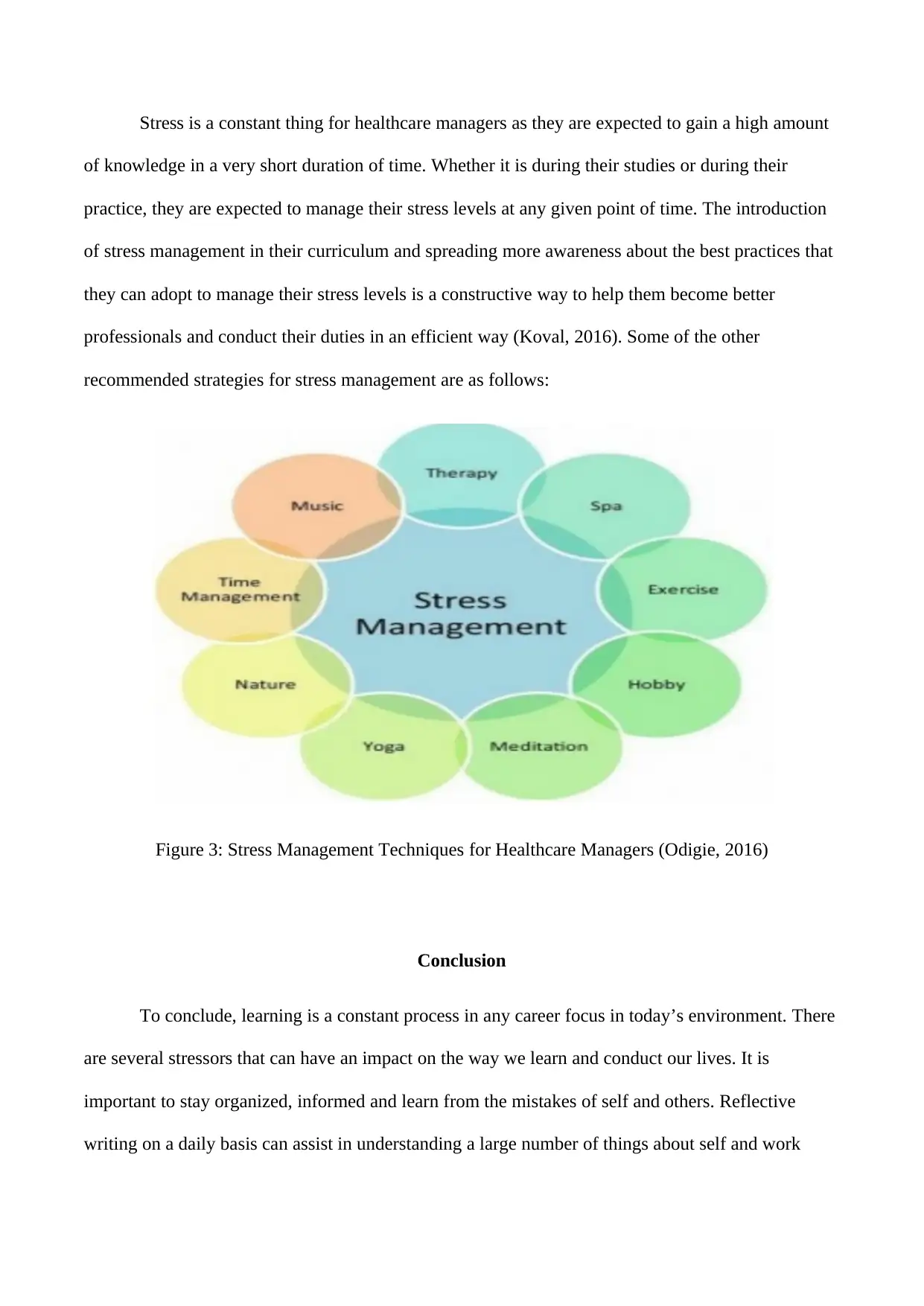
Stress is a constant thing for healthcare managers as they are expected to gain a high amount
of knowledge in a very short duration of time. Whether it is during their studies or during their
practice, they are expected to manage their stress levels at any given point of time. The introduction
of stress management in their curriculum and spreading more awareness about the best practices that
they can adopt to manage their stress levels is a constructive way to help them become better
professionals and conduct their duties in an efficient way (Koval, 2016). Some of the other
recommended strategies for stress management are as follows:
Figure 3: Stress Management Techniques for Healthcare Managers (Odigie, 2016)
Conclusion
To conclude, learning is a constant process in any career focus in today’s environment. There
are several stressors that can have an impact on the way we learn and conduct our lives. It is
important to stay organized, informed and learn from the mistakes of self and others. Reflective
writing on a daily basis can assist in understanding a large number of things about self and work
of knowledge in a very short duration of time. Whether it is during their studies or during their
practice, they are expected to manage their stress levels at any given point of time. The introduction
of stress management in their curriculum and spreading more awareness about the best practices that
they can adopt to manage their stress levels is a constructive way to help them become better
professionals and conduct their duties in an efficient way (Koval, 2016). Some of the other
recommended strategies for stress management are as follows:
Figure 3: Stress Management Techniques for Healthcare Managers (Odigie, 2016)
Conclusion
To conclude, learning is a constant process in any career focus in today’s environment. There
are several stressors that can have an impact on the way we learn and conduct our lives. It is
important to stay organized, informed and learn from the mistakes of self and others. Reflective
writing on a daily basis can assist in understanding a large number of things about self and work
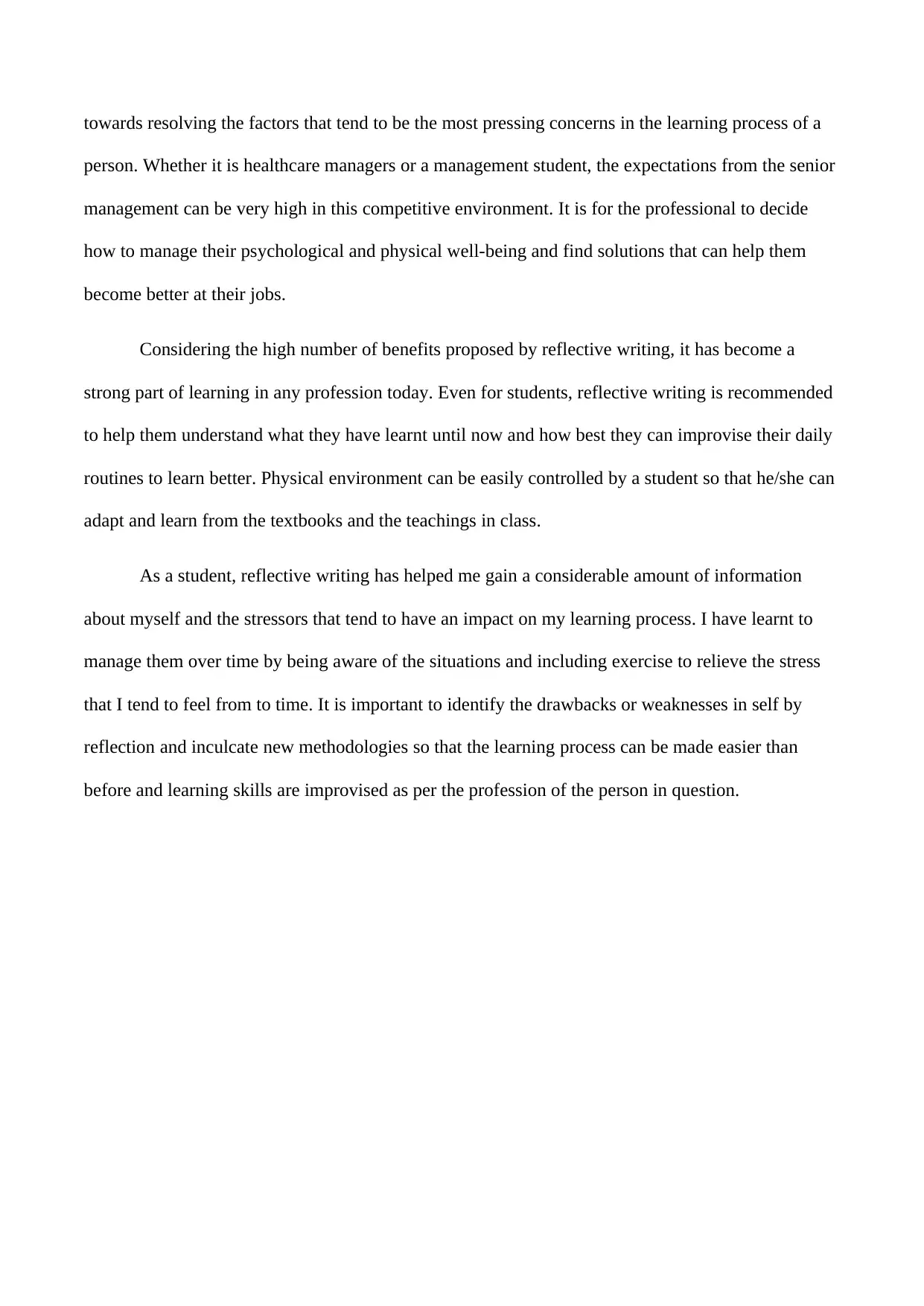
towards resolving the factors that tend to be the most pressing concerns in the learning process of a
person. Whether it is healthcare managers or a management student, the expectations from the senior
management can be very high in this competitive environment. It is for the professional to decide
how to manage their psychological and physical well-being and find solutions that can help them
become better at their jobs.
Considering the high number of benefits proposed by reflective writing, it has become a
strong part of learning in any profession today. Even for students, reflective writing is recommended
to help them understand what they have learnt until now and how best they can improvise their daily
routines to learn better. Physical environment can be easily controlled by a student so that he/she can
adapt and learn from the textbooks and the teachings in class.
As a student, reflective writing has helped me gain a considerable amount of information
about myself and the stressors that tend to have an impact on my learning process. I have learnt to
manage them over time by being aware of the situations and including exercise to relieve the stress
that I tend to feel from to time. It is important to identify the drawbacks or weaknesses in self by
reflection and inculcate new methodologies so that the learning process can be made easier than
before and learning skills are improvised as per the profession of the person in question.
person. Whether it is healthcare managers or a management student, the expectations from the senior
management can be very high in this competitive environment. It is for the professional to decide
how to manage their psychological and physical well-being and find solutions that can help them
become better at their jobs.
Considering the high number of benefits proposed by reflective writing, it has become a
strong part of learning in any profession today. Even for students, reflective writing is recommended
to help them understand what they have learnt until now and how best they can improvise their daily
routines to learn better. Physical environment can be easily controlled by a student so that he/she can
adapt and learn from the textbooks and the teachings in class.
As a student, reflective writing has helped me gain a considerable amount of information
about myself and the stressors that tend to have an impact on my learning process. I have learnt to
manage them over time by being aware of the situations and including exercise to relieve the stress
that I tend to feel from to time. It is important to identify the drawbacks or weaknesses in self by
reflection and inculcate new methodologies so that the learning process can be made easier than
before and learning skills are improvised as per the profession of the person in question.
⊘ This is a preview!⊘
Do you want full access?
Subscribe today to unlock all pages.

Trusted by 1+ million students worldwide
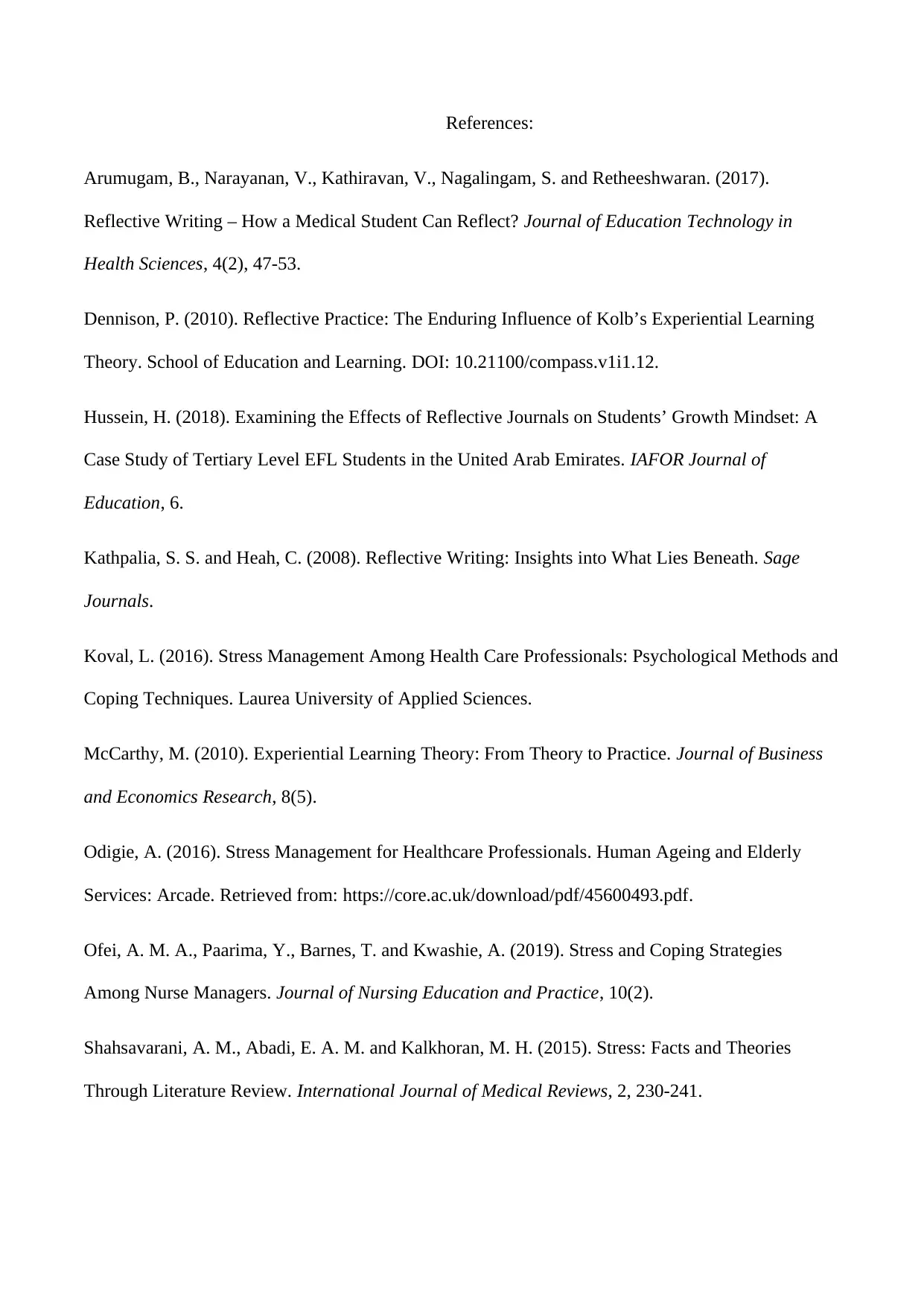
References:
Arumugam, B., Narayanan, V., Kathiravan, V., Nagalingam, S. and Retheeshwaran. (2017).
Reflective Writing – How a Medical Student Can Reflect? Journal of Education Technology in
Health Sciences, 4(2), 47-53.
Dennison, P. (2010). Reflective Practice: The Enduring Influence of Kolb’s Experiential Learning
Theory. School of Education and Learning. DOI: 10.21100/compass.v1i1.12.
Hussein, H. (2018). Examining the Effects of Reflective Journals on Students’ Growth Mindset: A
Case Study of Tertiary Level EFL Students in the United Arab Emirates. IAFOR Journal of
Education, 6.
Kathpalia, S. S. and Heah, C. (2008). Reflective Writing: Insights into What Lies Beneath. Sage
Journals.
Koval, L. (2016). Stress Management Among Health Care Professionals: Psychological Methods and
Coping Techniques. Laurea University of Applied Sciences.
McCarthy, M. (2010). Experiential Learning Theory: From Theory to Practice. Journal of Business
and Economics Research, 8(5).
Odigie, A. (2016). Stress Management for Healthcare Professionals. Human Ageing and Elderly
Services: Arcade. Retrieved from: https://core.ac.uk/download/pdf/45600493.pdf.
Ofei, A. M. A., Paarima, Y., Barnes, T. and Kwashie, A. (2019). Stress and Coping Strategies
Among Nurse Managers. Journal of Nursing Education and Practice, 10(2).
Shahsavarani, A. M., Abadi, E. A. M. and Kalkhoran, M. H. (2015). Stress: Facts and Theories
Through Literature Review. International Journal of Medical Reviews, 2, 230-241.
Arumugam, B., Narayanan, V., Kathiravan, V., Nagalingam, S. and Retheeshwaran. (2017).
Reflective Writing – How a Medical Student Can Reflect? Journal of Education Technology in
Health Sciences, 4(2), 47-53.
Dennison, P. (2010). Reflective Practice: The Enduring Influence of Kolb’s Experiential Learning
Theory. School of Education and Learning. DOI: 10.21100/compass.v1i1.12.
Hussein, H. (2018). Examining the Effects of Reflective Journals on Students’ Growth Mindset: A
Case Study of Tertiary Level EFL Students in the United Arab Emirates. IAFOR Journal of
Education, 6.
Kathpalia, S. S. and Heah, C. (2008). Reflective Writing: Insights into What Lies Beneath. Sage
Journals.
Koval, L. (2016). Stress Management Among Health Care Professionals: Psychological Methods and
Coping Techniques. Laurea University of Applied Sciences.
McCarthy, M. (2010). Experiential Learning Theory: From Theory to Practice. Journal of Business
and Economics Research, 8(5).
Odigie, A. (2016). Stress Management for Healthcare Professionals. Human Ageing and Elderly
Services: Arcade. Retrieved from: https://core.ac.uk/download/pdf/45600493.pdf.
Ofei, A. M. A., Paarima, Y., Barnes, T. and Kwashie, A. (2019). Stress and Coping Strategies
Among Nurse Managers. Journal of Nursing Education and Practice, 10(2).
Shahsavarani, A. M., Abadi, E. A. M. and Kalkhoran, M. H. (2015). Stress: Facts and Theories
Through Literature Review. International Journal of Medical Reviews, 2, 230-241.
Paraphrase This Document
Need a fresh take? Get an instant paraphrase of this document with our AI Paraphraser
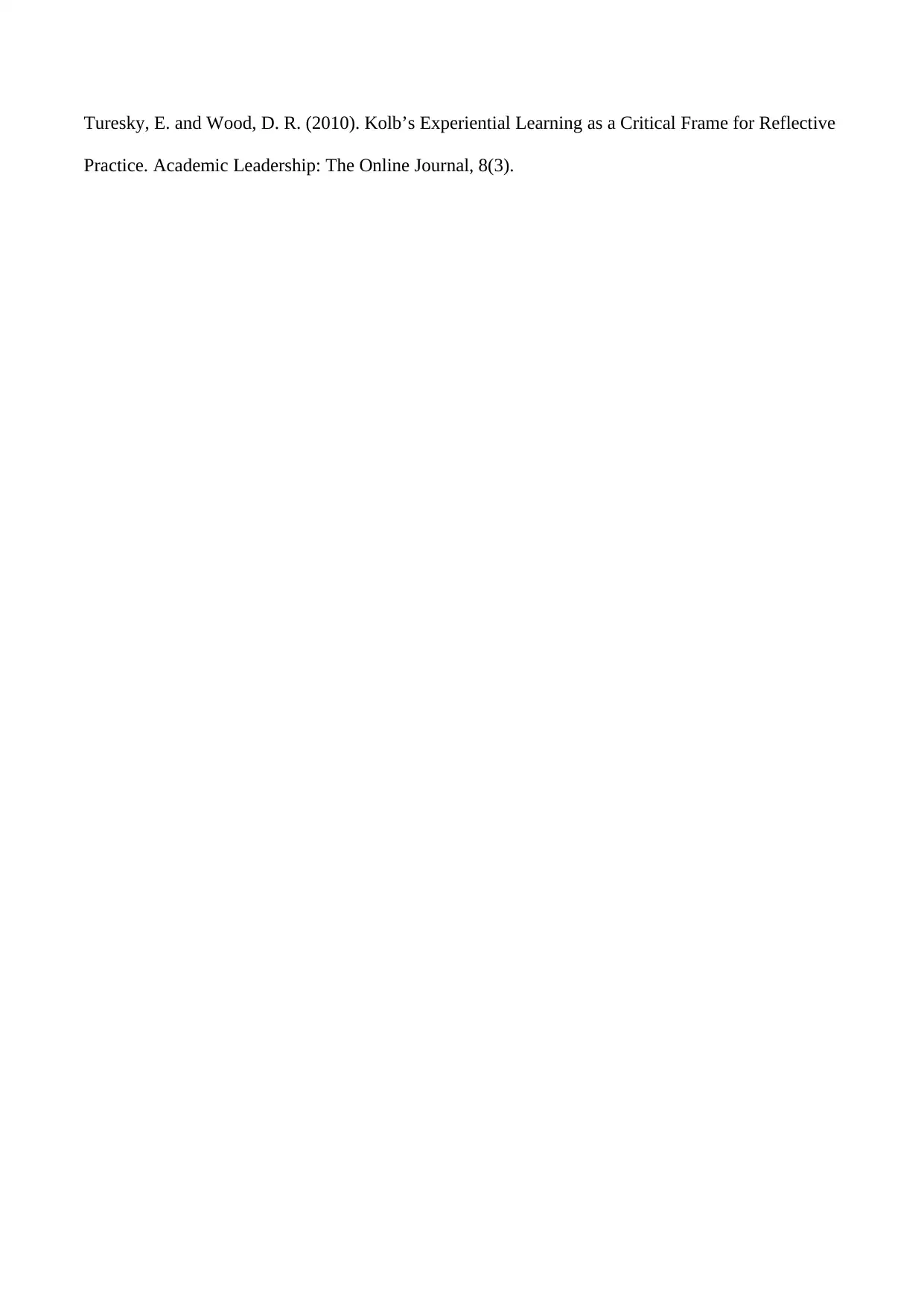
Turesky, E. and Wood, D. R. (2010). Kolb’s Experiential Learning as a Critical Frame for Reflective
Practice. Academic Leadership: The Online Journal, 8(3).
Practice. Academic Leadership: The Online Journal, 8(3).
1 out of 11
Related Documents
Your All-in-One AI-Powered Toolkit for Academic Success.
+13062052269
info@desklib.com
Available 24*7 on WhatsApp / Email
![[object Object]](/_next/static/media/star-bottom.7253800d.svg)
Unlock your academic potential
Copyright © 2020–2026 A2Z Services. All Rights Reserved. Developed and managed by ZUCOL.



